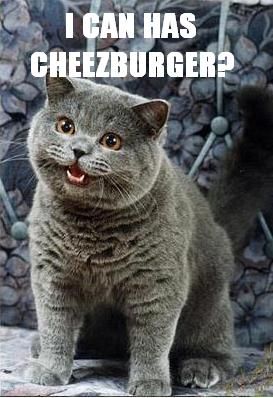JULY 1, 2010
LOLCats and human generosity
 You may already be a fan of goofy pictures of cats with oddly-spelled captions called LOLCats (from the abbreviation for Laughing Out Loud). You'll find them in abundance at the site I Can Has Cheezburger.
You may already be a fan of goofy pictures of cats with oddly-spelled captions called LOLCats (from the abbreviation for Laughing Out Loud). You'll find them in abundance at the site I Can Has Cheezburger.
Or you may dismiss LOLCats as yet another stupid internet time waster, further proof of the decline of civilization. Kids these days!
Author and educator Clay Shirky has a different take on LOLCats: he considers them powerful evidence that people 1) like to create and 2) like to share. He admits that they have value only to the community of people already interested in LOLCats, but views them positively, a first step towards changing the world through digital technology.
He explains in the video below: "The stupidest possible creative act is still a creative act." He reminds us that much of what is printed has little social value, yet the printing press transformed the world. The value is in acting, moving from consuming to creating.
Working together
Shirky describes cognitive surplus as the combination of the collective free time of people throughout the world, put to use via digital media tools.
He believes that this, plus human generosity, can help solve the world's problems. His prime example is the website Ushahidi.com, an open-source platform that makes it easy for individuals to report information in a way that others can share it by superimposing it on a map.
Ushahidi played a significant role in relief efforts after the 2010 earthquake in Haiti. Haitians could text a report on conditions in their area (injured or dead people, infrastructure damage, security threats, etc.). The information was assembled and labeled on a map that relief/aid workers could use to get help where it was needed most.
This same collaborative information gathering platform has been used to track things everything from snow-removal in Washington, DC to violence in Kenya (rapes, deaths, looting).
Games and education
Shirky's cognitive surplus idea dovetails nicely into game-designer Jane McGonigal's belief that we can solve at least some of the world's problems by playing more video games. McGonigal views the three billion hours per week people spend playing online games as an untapped resource for solving the problems of hunger, poverty, climate change, obesity and more. She too talks about how in the game world people collaborate and cooperate with great focus on solving problems.
As I listen to these speakers I realize that somewhere here may be the key to transforming education from drudgery to challenge. Most educators would agree that students working together— collaboration—is a great way to learn. Not always, but much of the time. Students collaborate all the time playing World of Warcraft, why can't we build a similar system of challenges, cooperation and rewards into our classrooms and labs?
It's partly motivation. Shirky uses a study of daycare centers to emphasize the importance of intrinsic motivation. In the study, when the centers instituted a "late fee" for parent who didn't show up on time to pick up their kids it tripled the number of late parents! Paying a fine seemed to make the parents feel it was less important to show up on time. This was a contractual constraint as opposed to a social constraint. Social constraints are much more effective.
The conclusion: in general we perform better when doing something because we like to do it than because someone told us to or we're being paid to. To me this raises significant questions about the role of grades (more contractual) if our goal is to encourage real learning (more social).
I can haz cheezburger?
And eventually we get back to LOLcats and the value of doing something versus doing nothing. You start with a silly picture of your cat and you end up changing the world. You and a bunch of like-minded people. Working together using digital media tools. Playing games, maybe.
More
Reality is Broken, Start to Finish - November 12, 2011
Games for Good: FoldIt and Superbetter - October 1, 2011
Just Five More Minutes, Dad, I've Almost Cured Cancer: Gaming to Save The World - February 5, 2011
Games? Seriously? (Yes!) - April 6, 2010
Top |
|
![]()
